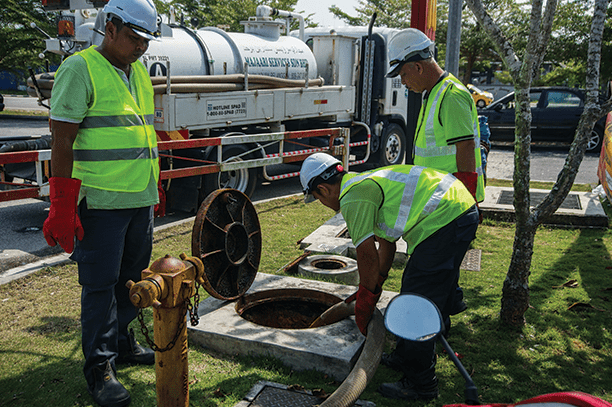Septic system odors can be inconvenient and might be a sign of deeper problems that need to be resolved. Septic tank pumping in Wilsonville is essential for a healthy and odor-free septic system and requires knowledge of the causes, implementation of preventative measures, and knowledge of efficient solutions. In this quick tutorial, we’ll look at some typical septic system odor causes, offer helpful preventive advice, and suggest solutions for odor problems that have already arisen. These recommendations can help you maintain a healthy septic system and a comfortable living space.
Understanding the Causes of Septic System Odors
Unpleasant odors coming from a septic system may be a sign of internal problems. To perform regular septic service in Wilsonville and handle any potential issues, it is imperative to understand the causes of these odors. Septic system odors can be caused by several things, including:
Poor Ventilation:
In a properly operating septic system, ventilation pipes allow gasses to escape, preventing odors from re-entering the home. Gasses can build up and produce bad odors inside and outside the building if these pipes get clogged or broken.
Problems with the drain field:
Wastewater is dispersed and filtered in the drain field, which is an essential part of the septic system. Sewage backup and unpleasant odors may result from broken, obstructed, or saturated drain fields.
Lack of Maintenance:
Septic tank overload and the emission of foul-smelling gasses can result from failing to perform routine septic tank pumping in Wilsonville, such as infrequent pumping or failing to address system problems. Solids buildup in the tank might decrease system performance overall and cause odors.
Leaks or flaws:
Leaks or flaws in the plumbing or septic tank can let foul gasses escape into the neighborhood. These leaks might be caused by outdated infrastructure, poor installation, damage from tree roots, or shifting soil, among other things.
Blockages or damage to the pipes leading to or leaving the septic tank can limit the flow of wastewater, causing backups and unpleasant odors. The accumulation of sediments, improper garbage disposal, or invasive tree roots can all cause these problems.
Use of harsh chemicals, excessive antibacterial treatments, or septic tank additives that upset the normal balance of bacteria in the system can all have a detrimental effect on the septic system’s performance and lead to odors.
Prevention Measures for Septic System Odors
For your property’s surroundings to remain healthy and pleasant, septic system odor prevention is essential. You may lessen the possibility of smells and make sure your septic system is operating correctly by putting the following preventative steps into practice:
Schedule routine septic system pumping and inspections with an experienced service provider. This guarantees optimal system performance and helps prevent sediments from building up in the tank.
Avoid flushing or draining non-biodegradable materials down the toilet or drains, such as grease, oils, chemicals, diapers, feminine hygiene products, or excessive paper goods. These can clog the system, alter the bacterial ecosystem, and cause odors.
Consuming too much freshwater can overtax the septic system, cause drainage problems, and produce unpleasant odors. Water can be saved by repairing leaks quickly, using low-flow faucets, spacing out laundry loads, and limiting water use to short bursts.
Remedies for Existing Septic System Odors
To return to a comfortable and healthy atmosphere if you are already experiencing septic system odors, it is crucial to solve the problem immediately. Take into account these solutions to eliminate current septic system odors:
Check Ventilation:
Verify that your septic system’s ventilation pipes are clear of blockages by looking at them. Remove any obstructions, such as leaves or debris that might be obstructing the correct gas escape.
Pumping and Cleaning:
Arrange for a professional pumping service if it has been a while since your last septic tank was pumped. Sludge and solid buildup in the tank can be removed to assist in getting rid of odors and repairing the system.
Inspection and Repair of Leaks:
Inspect the septic tank, distribution box, and pipes leading to and from the tank for any leaks or cracks. By fixing these leaks, odor-producing gasses won’t flow into the neighborhood.
A professional septic system service provider should be consulted if you suspect drain field issues, such as saturation or obstruction. They can evaluate the condition and make recommendations for the best courses of action, which may involve soil aeration, the addition of bacterial additions, or, in extreme cases, the replacement of the drain field.
Additional Tips for Odor Management
Use Septic-Safe Goods:
Make use of personal care and household cleaning goods that bear the septic-safe label. A septic system’s natural bacteria balance can be upset by harsh chemicals, which also cause odors. When possible, choose biodegradable and environmentally friendly substitutes.
Maintain Regular Drain and Fixture Cleaning:
To avoid the accumulation of organic waste and associated odors, keep drains, toilets, and fixtures clean. Consuming drain cleaners excessively can affect the septic system, so avoid pouring grease or food scraps down the drains.
Manage Grease and Cooking Oils:
Collect cooking oils and grease in a container, then properly discard it in the trash.
Limit Strong Odours:
Avoid adding too many things with a strong scent to the septic system. Avoid throwing away a lot of coffee grounds, objects with strong perfumes, or substances that could emit strong odors.
Check for any plumbing leaks or drips that may contribute to moisture buildup and associated odor problems on a regular basis. Any leaks or plumbing problems should be fixed to avoid further troubles.
Conclusion
Septic system odors can make your house less comfortable and can be a sign of internal issues. Septic system odors can be controlled and removed by determining the causes, putting preventive measures in place, and using efficient treatments. The key to preventing odors is routine maintenance, appropriate waste disposal, proper ventilation, and prompt repairs. American On-Site Septic can help identify and resolve the underlying problems if odors continue. You may benefit from a clean, odor-free environment while preserving the longevity and effectiveness of your septic system by putting the health of the septic system first. Contact us today to book your appointment.






